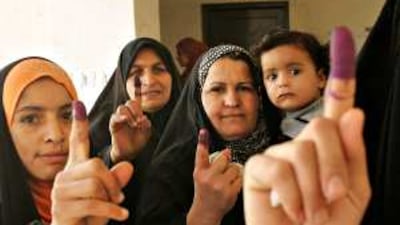Iraqi authorities must take the necessary steps to allow people with disabilities to participate in the coming parliamentary elections, a report by Human Rights Watch found on Thursday.
On October 10, millions of Iraqis will head to the polls to vote. But many of the polling stations, located in schools across the country, are inaccessible to people with disabilities.
The report, titled 'No One Represents Us’: Lack of Access to Political Participation for People with Disabilities in Iraq said hundreds of thousands of people may not be able to vote in the elections without urgent changes taking place.
“People with disabilities in Iraq are facing significant obstacles to participating in upcoming parliamentary elections on October 10, 2021, due to discriminatory legislation and inaccessible polling places,” said the report.
The country has one of the highest disabled populations in the world, although exact figures are not known.
“It is their right,” the report said.
It stipulates that many of the ballot boxes are usually stationed on the second floor in buildings that have no lifts, making it impossible for people to vote.
The country “has no mobile voting stations, electronic voting, or postal voting, perhaps because of Iraq’s weakened postal system”, it said.
Disabled people who use mobility assistance devices also face difficulties reaching polling stations because of the ban on operating vehicles on election day.
“The government should ensure that polling places are accessible to all voters,” said Belkis Wille, a senior crisis and conflict researcher at Human Rights Watch.
“While some steps will take time, like amending legislation, others are easy, and the Independent High Electoral Commission has no excuse to continue to fail to address accessibility,” Ms Wille said.
Electoral materials are not presented in accessible formats such as audio, Braille, large print, sign language, and easy-to-read.
The report also urged the UN and European missions monitoring election bodies in Iraq to include people with disabilities as expert monitors.
“Countries financially supporting Iraq’s elections and monitoring missions, including those who have been part of the conflict, should ensure that they help make Iraq more accessible for people with disabilities, including its political system,” Ms Wille said.


